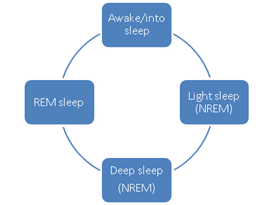
It’s important, now more than ever, to take care of our emotional wellbeing. Healthy sleep routines, developing new techniques in regulating emotions and supporting cognitive health are all great ways of facilitating a positive wellbeing.
Sleep plays a key role in supporting good health; both physically and mentally.
When we sleep, the body works hard to support tissue repair, releasing hormones for supporting growth and maintaining healthy brain function. Without good quality sleep it can be hard to concentrate and be mentally aware.
When we sleep our body cycles several times through four different sleep stages:

During these sleep stages, there are two types of sleep, known as Rapid Eye Movement (REM) and non–Rapid Eye Movement (NREM). During a typical night, you will move between these two types of sleep, with deeper periods of REM sleep happening as we enter morning. This can be when we have most of our vivid dreams.
Stage 1—Awake/into sleep: The first stage of non-REM sleep often takes several minutes to experience as we move from being awake to asleep. It is at this stage that our breathing, heart rate and eye movements all begin to slow down.
Stage 2—Light sleep NREM: This second stage is where you will experience a period of light seep before you start moving into a deeper sleep. It’s at this stage where there’s an increase in electrical activity and you might experience physical jerks. During this stage, your breathing will slow alongside your heart rate and your temperature drops. This is also when your eye movement will stop.
Stage 3—Deep sleep: This is the vital stage of sleep which helps us to feel well rested when we wake. During this stage, heart rate and heartbeat will slow right down to the lowest level in the sleep cycle. It’s at this point during sleep that it can be difficult to wake you up.
Stage 4—REM sleep: This fourth stage of sleep is where your eye lids will be closed but your eyes will be moving side to side in a quick motion. Your heart rate and blood pressure will raise, and your breathing will become faster. As this is the stage where most of your dreaming happens, the body will become temporarily paralysed to stop you from trying to perform your dreams.
When thinking about implementing a positive sleep routine there are some key ideas you might want to try:
The amount of sleep someone needs depends on the individual however, age does play a role in the number of hours sleep a person needs.
Babies have the most amount of sleep, sleeping on average between 16 to 18 hours per day. This is because babies are going through a period of significant growth and need lots of sleep to support this development.
For school-aged children and teenagers, they can sleep for an average of 9.5 hours each night, and when you move into adulthood you are likely to require between 7-9 hours.
After the age of 60, sleep quality can reduce, leading to increased periods of waking through the night.
Melatonin is a hormone that your body produces to promote sleep. The circadian rhythm is your body’s 24-hour clock that responds to light and dark. It helps you to manage the flow of the day. How often do you find you get hungry or tired around the same time each day? That’s your circadian rhythm prompting you for flow and routine of the day. Consistent sleep routines help to support your circadian rhythm.
Recent research has found that exposure to blue light can reduce the production of melatonin and have an effect on our circadian rhythm. Blue light can be found in many of the common electronics we find around the home; tablets, mobile phones, computers, TV screens.
Top tip: Reduce or completely cut out exposure to blue light at least two hours before sleep.